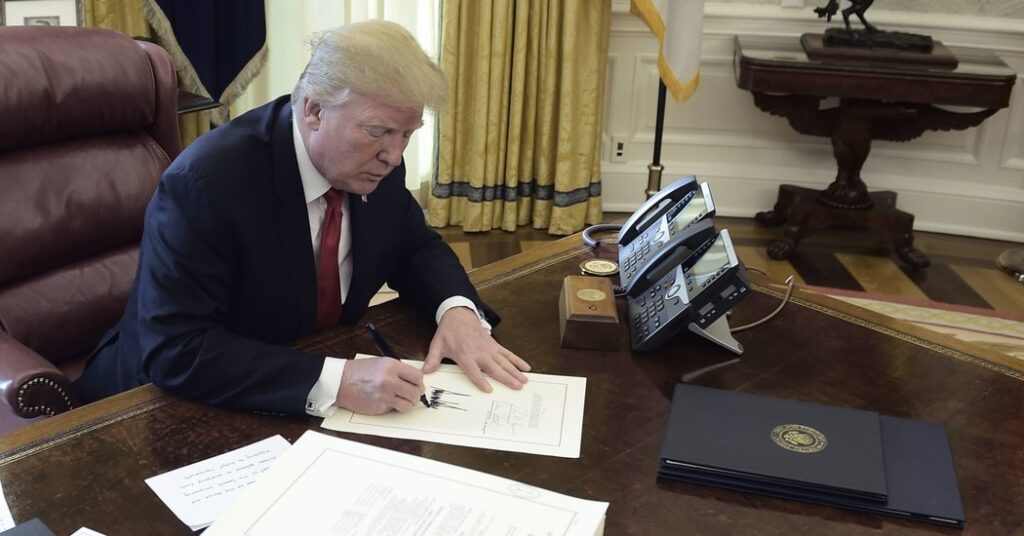Republicans in Congress are racing to deliver a legislative blockbuster aligned with former President Donald Trump’s 2024 campaign pledges, pushing a mammoth bill that bundles deep tax breaks, major spending cuts, and aggressive immigration enforcement ahead of the Memorial Day deadline.
Dubbed “The One, Big, Beautiful Bill” by its authors — a deliberate nod to Trump’s rhetoric — the package is being fast-tracked by GOP House Speaker Mike Johnson, who aims to secure House passage and send the bill to the Democratic-led Senate in a matter of weeks.
While Republicans herald the measure as a long-overdue reset of national priorities, Democrats have vowed to fight back. House Minority Leader Hakeem Jeffries labeled the bill “extreme and toxic,” warning it would devastate vulnerable communities.
$3.7 Trillion in Tax Cuts, with Strings Attached
At the core of the bill lies an ambitious $5 trillion tax cut proposal, reduced to $3.7 trillion after GOP lawmakers rolled back several of President Joe Biden’s clean energy credits. Trump-era individual tax cuts would be made permanent, and new exemptions would be introduced — including untaxed tips, overtime, and interest on auto loans.
Additional provisions include:
-
A $10,000 interest deduction on U.S.-assembled vehicle loans (set to expire with Trump’s term).
-
A $4,000 Social Security income deduction for seniors below specified income thresholds.
-
A proposed expansion of the state and local tax (SALT) deduction from $10,000 to $30,000 for middle-income families.
Medicaid and Food Aid Face Sweeping Reforms
A centerpiece of the fiscal overhaul is a proposed $900 billion reduction in Medicaid spending. New eligibility rules would require “community engagement” — at least 80 hours monthly of work or education — for able-bodied adults without dependents. Applicants with homes worth over $1 million would also be disqualified.
Starting 2029, Medicaid recipients would have to verify eligibility twice a year instead of once, a move Republicans say targets waste but which critics argue could cause over 7 million to lose healthcare access.
The Supplemental Nutrition Assistance Program (SNAP) would also shift partially to state funding. States would begin covering 5% of SNAP benefit costs and 75% of administrative expenses. Work requirements for recipients would be extended to individuals up to age 64, excluding only caregivers of young children.
Massive Border Security Funding and Deportation Surge
The GOP bill revives a cornerstone of Trump’s earlier agenda: border wall expansion. The legislation earmarks $46.5 billion to resume U.S.-Mexico wall construction and an additional $22.5 billion to hire 8,000 immigration personnel, offer bonuses, and fund detention centers.
Major provisions include:
-
Annual deportation goal of 1 million migrants.
-
Authorization for 100,000 detention beds.
-
New $1,000 asylum fee for applicants — a first in U.S. history.
-
Expansion of Immigration and Customs Enforcement by 10,000 officers.
Defense Buildup and the ‘Golden Dome’ Project
The House Armed Services Committee exceeded its initial $100 billion cap, passing $150 billion in defense spending. That includes:
-
$25 billion for the “Golden Dome for America,” a missile defense shield championed by Trump.
-
$21 billion to replenish ammunition stockpiles.
-
$34 billion in naval fleet expansion.
-
$9 billion for servicemember housing, healthcare, and bonuses.
Higher Taxes for Universities, Fewer Protections for Borrowers
The legislation proposes a sweeping reform of federal student loan programs. Two repayment options would replace all current plans, and Biden-era borrower protection regulations would be repealed.
Other highlights:
-
$330 billion in estimated savings through student loan restructuring.
-
A new 21% tax on large university endowments.
-
Elimination of existing discharge options for students whose institutions closed or defrauded them.
Federal Workers, Fossil Fuel Industry, and Public Lands
The bill proposes pension reforms targeting federal employees hired before 2014, requiring higher contribution rates to match post-2014 hires.
Meanwhile, energy provisions encourage fossil fuel extraction:
-
Oil and gas royalties on federal land would drop to 12.5%.
-
Coal royalties would fall to 7%.
-
New mandates for leasing 6,250 square miles of public land for coal mining.
-
Authorization for four new oil and gas lease sales in the Arctic National Wildlife Refuge.
In a late addition, Republicans inserted language authorizing mass land sales in Nevada and Utah drawing swift condemnation from Democrats and conservationists.
What’s Next?
With Memorial Day as a self-imposed deadline, Republican leaders are moving aggressively to fine-tune the bill and secure necessary votes. However, the package faces steep odds in the Senate, where Democrats hold a narrow majority and have signaled strong opposition.
Still, House Republicans remain adamant that the legislation represents a pivotal course correction for the nation one they believe American voters demanded at the ballot box.


